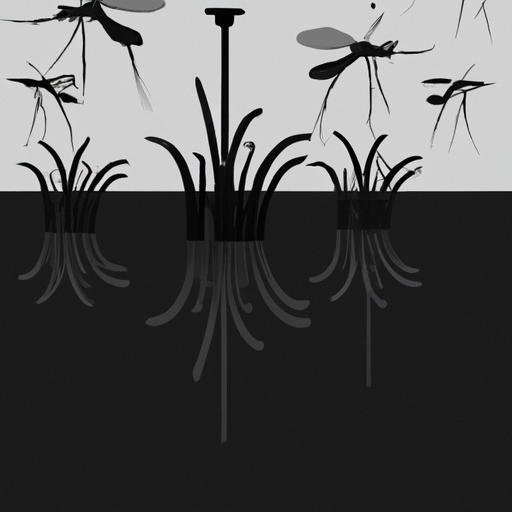What Factors Affect the Lifespan of Gnats?
Gnats are small, flying insects that can be found in many parts of the world. They have a relatively short lifespan, typically ranging from a few days to several weeks. However, there are several factors that can affect the lifespan of gnats and determine how long they live.
The first factor is temperature. Gnats prefer warm temperatures and will generally live longer in warmer climates than in colder ones. In addition, humidity levels also play an important role in determining the lifespan of gnats; high humidity levels tend to increase their life expectancy while low humidity levels can shorten it significantly.
Another factor that affects the lifespan of gnats is food availability. Gnats need access to food sources such as decaying organic matter or other insects in order to survive for extended periods of time; if these resources are not available, their lifespans may be shortened considerably.
Finally, predation by other animals is another major factor that affects the lifespan of gnats; if they are preyed upon by birds or other predators, their lifespans may be drastically reduced due to predation pressure.
In conclusion, there are several factors that affect the lifespan of gnats including temperature, humidity levels, food availability and predation pressure from other animals. By understanding these factors and taking steps to ensure optimal conditions for them to thrive in (such as providing adequate food sources), it is possible to extend their lifespans significantly and enjoy their presence for longer periods of time
How to Identify Different Types of Gnats and Their Lifespans
Gnats are small, flying insects that can be found in a variety of habitats. They are often mistaken for mosquitoes due to their similar size and shape, but they differ in several ways. Gnats have short lifespans and come in many different species, each with its own unique characteristics. Identifying the type of gnat you’re dealing with is important for understanding how to best control them.
The most common types of gnats include fruit flies, fungus gnats, eye gnats, and drain flies. Fruit flies are small (1/8 inch long) tan or yellowish-brown insects that feed on overripe fruits and vegetables as well as other organic matter such as garbage or decaying plant material. Fungus gnats are dark gray or black and measure about 1/8 inch long; they feed on fungi growing in damp soil or decaying organic matter such as compost piles or mulch beds. Eye gnats are tiny (1/16 inch long) grayish-black insects that feed on the secretions from eyes of animals including humans; they can also bite if disturbed. Drain flies have a moth-like appearance with fuzzy wings; they measure up to 1/4 inch long and breed in drains where there is an accumulation of organic material such as grease or hair clogs.
The lifespan of a typical adult gnat varies depending on the species but generally ranges from one week to one month depending on environmental conditions such as temperature and humidity levels. Fruit fly adults typically live for two weeks while fungus fly adults may live up to four weeks under ideal conditions; eye gnat adults usually only survive for one week while drain fly adults may live up to three months under optimal conditions.
In conclusion, there are many different types of gnats which vary greatly in size, coloration, habitat preferences, feeding habits and lifespan duration depending on the species involved. Knowing how to identify these various types will help you better understand how best to control them around your home or business premises so you can enjoy a pest-free environment all year round!
How to Prevent Gnat Infestations in Your Home
Gnats are small, pesky insects that can be a nuisance in any home. They can be difficult to get rid of once they have infested an area, so it is important to take steps to prevent them from entering your home in the first place. Here are some tips for preventing gnat infestations in your home:
1. Keep windows and doors closed when possible. Gnats are attracted to light and will enter through open windows or doors if given the chance. Make sure all windows and doors are closed tightly when not in use, especially at night when gnats tend to be most active.
2. Clean up food spills immediately. Gnats feed on sugary substances such as spilled soda or juice, so make sure you clean up any food spills right away before they attract gnats into your home.
3. Use screens on windows and doors if possible. Screens can help keep out flying insects such as gnats by providing a physical barrier between them and the inside of your house or apartment building.
4 . Avoid leaving standing water outside near entryways . Standing water is a breeding ground for many types of insects including gnats, so make sure you avoid leaving puddles or other sources of standing water near entryways where they could easily enter your home .
5 . Vacuum regularly . Vacuuming regularly helps remove any eggs or larvae that may have been brought into the house on clothing or shoes , reducing the chances of an infestation occurring .
6 . Use insecticides if necessary . If all else fails , there are several types of insecticides available that can help control a gnat infestation , though it is best to consult with a professional exterminator before using these products in order to ensure proper application and safety precautions are taken .
The Benefits of Having Gnats Around Your Home
Gnats are small, flying insects that can be found in many homes. While they may seem like a nuisance, there are actually some benefits to having gnats around your home.
First of all, gnats can help to control the population of other pests. Gnats feed on other insects such as aphids and mosquitoes, which can be harmful to plants and humans alike. By controlling the population of these pests, gnats help keep your home and garden free from disease-carrying bugs.
Gnats also provide food for birds and other wildlife in your area. Many species of birds rely on gnat larvae as a source of nutrition during certain times of the year when food is scarce. This helps maintain a healthy balance in nature by providing an important food source for local wildlife populations.
Finally, having gnats around your home can also provide you with entertainment! Watching them flit about is quite mesmerizing and provides a nice distraction from everyday life. Plus, it’s always fun to try to catch them with your hands or using homemade traps!
In conclusion, while it may not seem like it at first glance, there are actually several benefits to having gnats around your home. They help control pest populations while providing food for local wildlife populations and entertainment for you!
Natural Ways to Get Rid of Gnats
Gnats are small, pesky insects that can be difficult to get rid of. Fortunately, there are several natural methods you can use to eliminate them from your home or garden.
One way to get rid of gnats is by using a homemade trap. To make one, fill a jar with apple cider vinegar and add a few drops of dish soap. The gnats will be attracted to the smell of the vinegar and will fly into the jar where they will become trapped in the soapy liquid.
Another effective method for getting rid of gnats is by using essential oils such as peppermint oil or eucalyptus oil. Simply mix a few drops with water in a spray bottle and spray it around areas where you have seen gnats congregating. The strong scent will repel them away from your home or garden.
You can also use natural predators such as ladybugs or lacewings to help control the population of gnats in your area. Ladybugs feed on aphids which attract gnats while lacewings feed on both aphids and larvae which helps reduce their numbers significantly over time.
Finally, keeping your home clean is an important step in preventing an infestation of gnats from occurring in the first place. Make sure all food scraps are disposed off properly and that any standing water sources such as flower pots are emptied regularly so that they don’t become breeding grounds for these pests
Common Diseases Caused by Gnat Bites
Gnat bites can cause a variety of diseases in humans. The most common diseases caused by gnat bites are malaria, dengue fever, and yellow fever.
Malaria is a mosquito-borne infectious disease that affects humans and other animals. It is caused by the Plasmodium parasite, which is transmitted to humans through the bite of an infected female Anopheles mosquito. Symptoms of malaria include fever, chills, headache, nausea and vomiting. If left untreated it can be fatal.
Dengue fever is another mosquito-borne viral infection that affects humans and other animals. It is caused by four different types of viruses that are transmitted to humans through the bite of an infected Aedes mosquito. Symptoms include high fever, severe headache, joint pain and rash on the body or face. In some cases it can lead to life-threatening complications such as hemorrhagic shock or organ failure if not treated promptly with supportive care such as fluids and rest.
Yellow Fever is a viral infection spread by mosquitoes that primarily affect people living in tropical areas in Africa and South America but can also occur in parts of Asia as well as Central America and Mexico . Symptoms include high fever , chills , muscle aches , nausea , vomiting , jaundice (yellowing skin)and abdominal pain . In severe cases it can lead to liver failure or even death if not treated promptly with supportive care such as fluids or medications .
Overall gnat bites should be taken seriously since they may cause serious illnesses if left untreated for too long . Therefore it’s important to take preventive measures against them such as using insect repellent when outdoors or wearing protective clothing when necessary .
Tips for Keeping Your Home Free from Gnat Infestations
1. Keep your home clean and free of food debris. Gnats are attracted to food sources, so it is important to keep your kitchen and other areas of the house free from crumbs, spills, and other food debris. Wipe down counters regularly with a damp cloth or mop, vacuum carpets and furniture regularly, and empty garbage cans often.
2. Store food properly. Make sure all foods are stored in airtight containers or in the refrigerator to prevent gnats from being attracted to them. Also make sure that pet foods are kept sealed tightly when not in use as gnats can be drawn to these as well.
3. Seal any cracks or crevices around windows or doors where gnats may enter your home from outside sources such as gardens or compost piles nearby.
4. Use natural repellents such as essential oils like peppermint oil which can be used on surfaces throughout the house to repel gnats away from them naturally without using harsh chemicals that could be harmful for you and your family’s health if inhaled or ingested accidentally by children or pets in the home environment .
5
Q&A
1. How long do gnats live for?
Gnats typically live for about two weeks, although some species may live up to a month.

